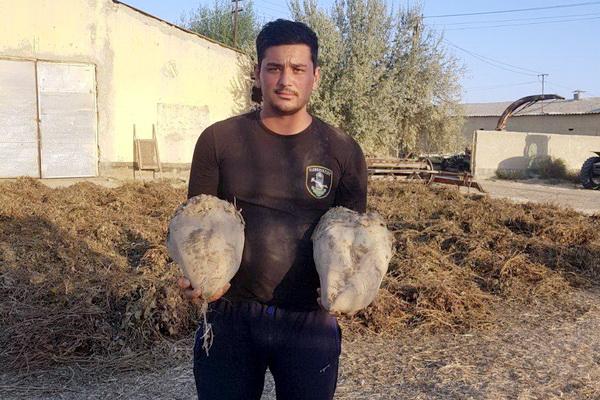
A farmer from Bukhara region has grown a 20-kg beet
Tashkent, Uzbekistan (UzDaily.com) -- A farmer from Bukhara region Shavkat Shodiev set an unusual record - he grew beets weighing almost 20 kilograms at his Zarafshon farm in Romitan district. This is a new variety of salt-tolerant beets "Centaurus", which, despite the salinity inherent in the arid climate of the region, took root well and brought a rich harvest of quite impressive sizes.
The introduction of new promising salt-tolerant crops in saline areas of Bukhara region is carried out within the framework of the FAO project “Integrated management of natural resources in drought-prone and saline agricultural landscapes of Central Asia and Turkey”.
According to FAO, saline soils occupy vast areas in the world - about 25% of the entire land surface. FAO experts are confident that salinization is a global problem for humanity. Secondary soil salinization is almost always the result of improper irrigation in crop production, resulting from excessive irrigation, which increases the level of saline groundwater or irrigation with highly mineralized water. Soil salinization, both natural and secondary under the conditions of irrigated agriculture, is one of the factors that enhance the desertification process. However, it is both a cause and a consequence of other agricultural problems.
Tackling soil salinization is now being considered in conjunction with other measures aimed at sustainable intensification of agriculture, which is one of the foundations of food security. And this FAO project is aimed specifically at early warning and drought risk reduction. Experts are developing guidelines for the management of salinization processes, including on-site demonstration of innovative approaches and technologies to reduce salinity.
In Uzbekistan, the project partners are the Ministry of Agriculture, the Ministry of Water Resources, the State Forestry Committee of the Republic of Uzbekistan, and Uzhydromet.
A significant part of the irrigated land in Uzbekistan is saline to one degree or another. In recent years, the amount of saline soils under the influence of secondary salinization has increased from 48.2 to 64.4%. It should be noted that it is salinity that is one of the main factors in reducing yields.
As the national coordinator of the project Mukhammadzhon Kosimov noted, “A high yield can be obtained only from high quality seeds. While our farmers are experiencing difficulties in finding and breeding seeds of new varieties of salt-tolerant crops. "
The introduction of new promising salt-tolerant crops in saline areas of the region will dramatically increase productivity. Thus, the new variety of salt-tolerant beets "Centaur" is resistant to salinity and drought, and the yield of root crops is 1000-1500 centners per hectare, which is about 30-50% higher than that of local varieties. Another advantage of this variety is that the aerial part of the root is 60%, which makes it easy to harvest by hand.
Within the framework of the project “Integrated management of natural resources in drought-prone and saline agricultural landscapes of Central Asia and Turkey” this year the beet variety “Centaur” will be grown on an area of 1 hectare, and in 2021 seed production and cultivation of this crop on farms will be launched. This will not only provide in the future the fodder base of farms in saline areas, but also increase the production of livestock products.
The project also provided other crops for sowing and seed production. For example, in the same farm "Zarafshon" in Romitan district of Bukhara region, a new alfalfa variety "Emiliana" was sown on 10 hectares of saline soils, which is very resistant to salinity, drought and cold weather. Its yield is 60-80% higher than that of local varieties. This variety was bred by specialists of the Serbian Institute of Field Cultivation and Vegetable Growing and is successfully grown on large areas in Europe. Aziz Nurbekov, consultant on drought risk management of the FAO Representative Office in Uzbekistan, noted that “Organization of sowing of alfalfa on irrigated lands is one of the new directions in modern agriculture, which plays an important role in increasing farmers’ incomes”.
In addition, within the framework of this FAO project, grape varieties that are resistant to drought and soil salinity are also grown in the Bukhara region. In the fall of 2019, 100 thousand pieces of selected grape cuttings were purchased for the Bukhara forestry enterprise. Cuttings adapted well on two plots with an area of more than 1 ha, survival rate was 75-80%.
Much work has been done in Kamashi district of Kashkadarya region. As you know, pistachio is one of the most drought-resistant tree and shrub species, which lives up to 1000 years. Taking into account these features, at the suggestion of the FAO expert, the khokimiyat of Kamashinsky district allocated 2500 hectares of land for planting this crop on both sides of the road connecting the villages of Kyzyltepa and Kokbulak. To carry out the work under the FAO project, 250 kg of pistachio seeds were delivered. In total, in the spring of 2020, pistachios were planted on a total area of more than 800 hectares. It is planned that in 2021 these pistachio fields will be leased out to the local population on a long-term basis through an auction.
Thus, within the framework of this FAO project, important steps have been taken towards combating drought and soil salinization in Uzbekistan.